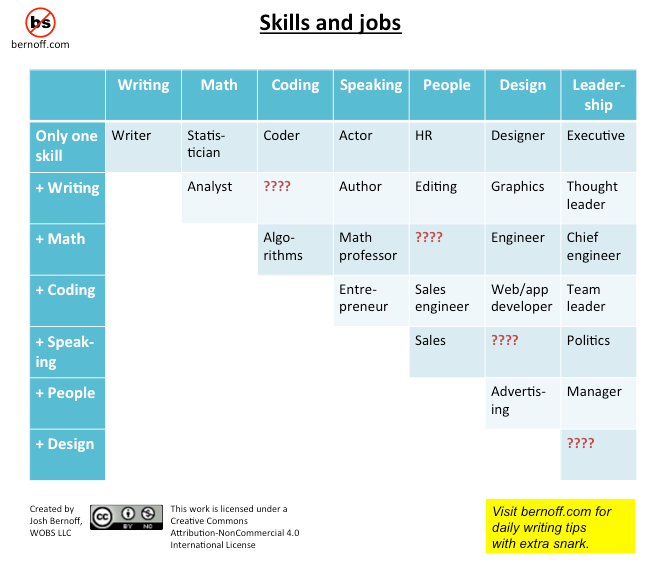What’s your second skill?
 What’s your skill? Good with people, good with words? Good for you. But what could you do with a second skill?
What’s your skill? Good with people, good with words? Good for you. But what could you do with a second skill?
Great coders are in demand — but there are a lot of them. Writers graduate from college and swarm like ants across the job market. You need one great skill. But one is no longer enough.
First off, demand for what you’re doing now may shift as technologies disrupt the market. Second, opportunity often arises in the spaces between skills. And lastly, being the best designer, the most persuasive speaker, or the whizziest math wiz gets tougher as you get older; there’s always somebody younger, faster, and smarter coming up behind you.
Having two skills means your career can flex based on what’s needed. It opens up more opportunities and never gets dull.
I was always mathematically skilled — it came easy to me. I was certain I was going to be a mathematician until three years into graduate school, when it suddenly became tedious. I met a smart business manager seeking a writer who could do math. She settled for me: a mathematician who could write.
Every job I’ve taken since then has depended on the math and the writing in different combinations. Together, they opened a lot of doors for me. When I added a third skill — public speaking — I was on my way to the top of the analyst world.
Here’s a list (obviously not complete) of skills you might have:
- Writing. Communicating with words.
- Math. Solving technical problems.
- Coding. Making computers do stuff.
- Speaking. Convincing people with your voice.
- People. Connecting with people one-on-one.
- Design. Making beautiful, functional things.
- Leadership. Motivating groups to work together.
Just for fun, I put together a table of careers that two of those skills might open up for you. Writers who can speak can become authors. Mathematically skilled coders build esoteric algorithms. Leaders good at public speaking can go into politics.
You could keep building on what you’re good at, but that keeps getting harder. Or you could work at something that’s not your strength and build that second skill. Which skill will you develop?
By the way, I’d love your comments on this chart, including filling in the empty spaces.
Photo: Steve Jurvetson via Flickr

coding+writing = good potential community managers.
people+math = pre-sales/product or service evangelist/analyst
speaking+design = steve jobs? 🙂
design+leadership = ceo of Autodesk?
Thanks for this post. My writing team sits in the Experience Design organization. We are actively cultivating design skills in order for the writers to better collaborate with interaction designers and visual designers, as well as to increase their skills in an increasingly competitive job market. Perhaps we should also train the designers to be better writers!
Coding + Writing = Technical Writer
People + Math = middle school math teacher (I currently teach middle school English and math and constantly put my people skills to use), OR personal accountant/tax preparer. My tax guy is an awesome people person, which is why I continue to have him prepare my taxes.
Love this post! Having secondary skills has opened up so many opportunities in my life that I could have never dreamed.
Josh, I really like this article. I’ve long held the belief that one must be prepared with a great foundation of “how to think” over having specific skills. But, in a world where one must earn a living, that person needs to add skills to the foundation. Your matrix is a very interesting way of showing how a good mix of skills can help one adapt to a changing world.
Some suggestions:
Coder + Writer = Documentation, tech writer, program manager
Design + Speaking = Product design lead, teacher
Leadership + Design = User experience exec, design agency exec
Coding + Writing = Hadley Wickham
Leadership + Design = Jobs / Ive
Design + Speaking = Hans Ross (+ math)
People + Math = Feynman
Design + Leadership = Product Management
Writing + Coding = Technical Writer
Design + Speaking = Chief Product Officer